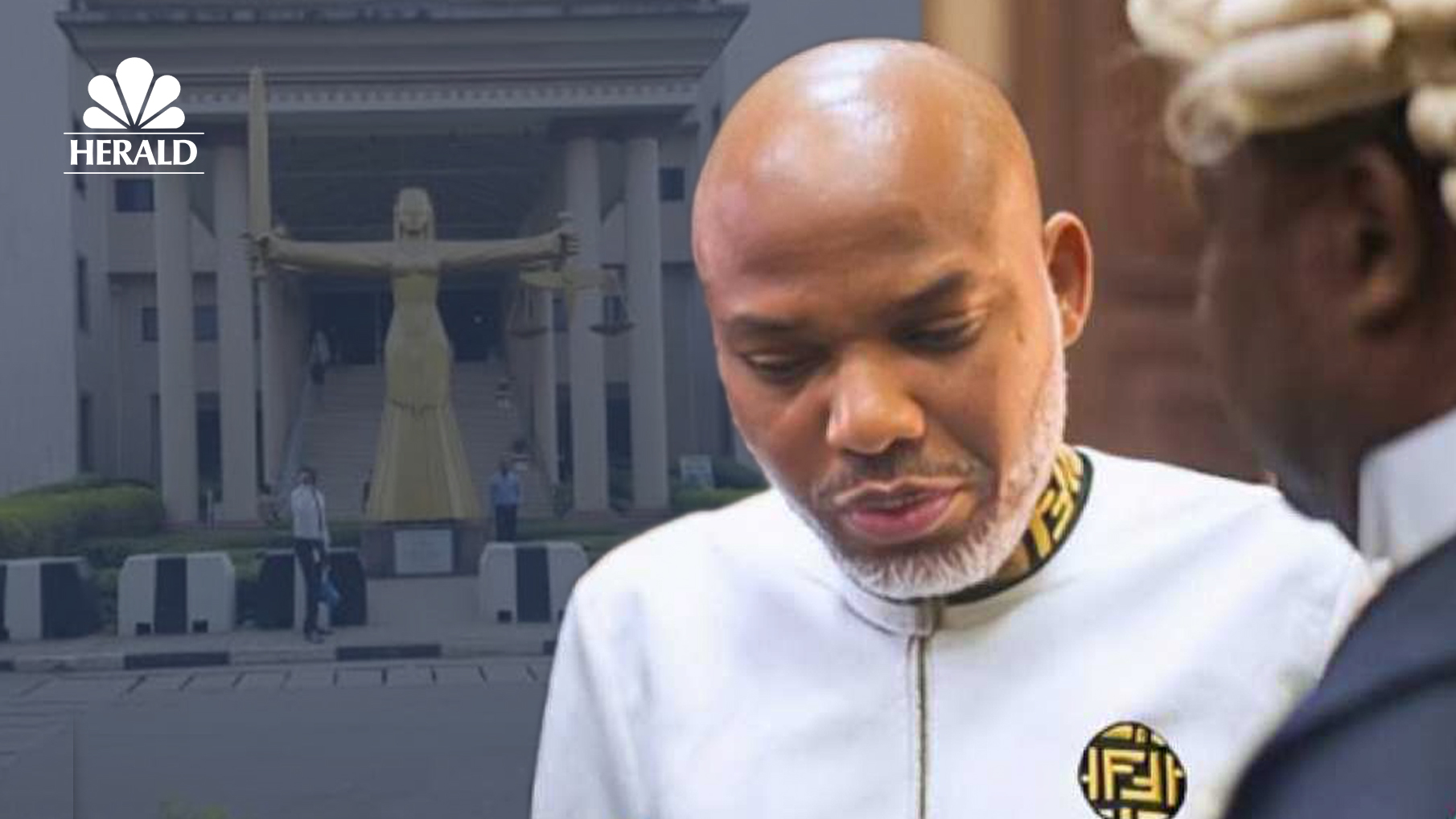
Nnamdi Kanu LIFE SENTENCING has become the most talked-about legal development in Nigeria today as the Federal High Court in Abuja delivered a landmark ruling that reshapes the ongoing debate around IPOB, Biafra agitation, and the country’s terrorism laws. The decision, handed down under the Terrorism Prevention Act, underscores the government’s evolving stance on separatist activity and national security threats.
The judgment that led to the Nnamdi Kanu LIFE SENTENCING ruling was issued after months of hearings, adjournments, legal motions, and public tension. Justice James Omotosho delivered the verdict in a courtroom packed with lawyers, security agents, journalists, and observers. The case, which has spanned several years, reached a decisive stage today as the court reviewed evidence tied to the government’s terrorism allegations.
Reactions to the Nnamdi Kanu LIFE SENTENCING ruling began pouring in within minutes of the court’s pronouncement. Supporters of the Indigenous People of Biafra (IPOB) expressed shock and disappointment. Meanwhile, some security analysts argued that the ruling reinforces the federal government’s anti-terrorism strategy. Across social and political circles, the judgment sparked renewed debates about justice, fairness, and national unity.
At the heart of the Nnamdi Kanu LIFE SENTENCING is the application of the Terrorism Prevention Act, Nigeria’s principal legislation governing terrorism-related offences. Prosecution lawyers maintained that IPOB’s activities, including public broadcasts, directives, and alleged operational orders, met the threshold for terrorism under the Act. The charge sheet highlighted actions considered capable of destabilising national security.
In delivering the Nnamdi Kanu LIFE SENTENCING, the judge referenced sections of the Terrorism Prevention Act that criminalise incitement, financing of terrorism, and participation in a proscribed organisation. IPOB was formally banned and classified as a terrorist group in 2017, a designation that Kanu’s lawyers have repeatedly challenged. However, the court reaffirmed the validity of that designation today.
Many legal experts analysing the Nnamdi Kanu LIFE SENTENCING argue that the ruling raises new questions about the interpretation of terrorism laws in Nigeria. Some note that the law’s broad definitions allow prosecutors significant flexibility. Others insist that such interpretations must be balanced against constitutionally guaranteed rights, including free speech and political expression.
The Nnamdi Kanu LIFE SENTENCING verdict also carries major political and social implications. The Biafra agitation movement, already deeply polarised, now faces a defining moment. Some analysts predict intensified activism in the South-East, while others believe the ruling may lead to internal restructuring within IPOB and its affiliates. What remains clear is that the sentencing has significantly altered the group’s trajectory.
Supporters watching the Nnamdi Kanu LIFE SENTENCING unfold argued that the proceedings were politically motivated. They claim that the government has used terrorism laws to silence dissent. Nigerian officials, however, assert that the case is purely security-driven. According to statements made during the hearings, the state’s priority is preventing violence and maintaining territorial integrity.
Lawyers representing Kanu, responding to the Nnamdi Kanu LIFE SENTENCING, described the ruling as “unlawful, unconstitutional, and inconsistent with previous appellate decisions.” They stated their intention to challenge the judgment at the Court of Appeal. They also hinted that the matter may eventually proceed to the Supreme Court if necessary.
With the Nnamdi Kanu LIFE SENTENCING ruling now official, attention has turned to Kanu’s appeal options. Under Nigerian law, a defendant sentenced under the Terrorism Prevention Act may file an appeal within a stipulated timeframe. Legal teams can challenge procedural errors, interpretation of the law, admissibility of evidence, and constitutional questions. Kanu’s lawyers are expected to rely on previous judgments that questioned aspects of his extradition and detention.
Political observers say the Nnamdi Kanu LIFE SENTENCING will likely influence national dialogue on restructuring, regional autonomy, and national identity. The ruling may also shape future enforcement actions against separatist movements across the country. Some predict that the decision could either deter similar movements or further energise them, depending on how the government manages post-judgment reactions.
Security agencies have increased patrols in the South-East following the Nnamdi Kanu LIFE SENTENCING announcement. Previous rulings in the case triggered spontaneous protests, road blockages, and civil unrest in some states. Authorities say they aim to prevent a repeat and maintain public order. Civic groups, meanwhile, have appealed for calm and restraint from all sides.
International observers reacting to the Nnamdi Kanu LIFE SENTENCING emphasised the importance of due process and human rights protections. Diplomatic missions are reportedly monitoring developments closely. Some organisations have called for transparency, fair appeals, and constructive engagement between the government and stakeholders from the South-East.
The economic implications of the Nnamdi Kanu LIFE SENTENCING may also be felt, especially in regions previously affected by IPOB-related sit-at-home orders. Business leaders hope that tensions do not escalate into renewed disruptions. Investors often view prolonged political instability as a risk factor, and today’s ruling may influence investment decisions in the near term.
Civil society organisations analysing the Nnamdi Kanu LIFE SENTENCING urged the government to consider political dialogue alongside legal measures. They argue that long-term stability in the South-East depends on addressing underlying grievances such as marginalisation, infrastructural deficits, and youth unemployment. The ruling, they say, should not replace broader conversations about nation-building.
For many Nigerians, the Nnamdi Kanu LIFE SENTENCING highlights the complex intersection of law, politics, ethnicity, and national cohesion. The case has evolved beyond a single individual and now represents broader issues of identity and federalism. Whether the judgment stabilises or further complicates the situation will depend on the actions of government leaders, community stakeholders, and IPOB members in the coming days.
Looking ahead, the Nnamdi Kanu LIFE SENTENCING may set a precedent for how Nigeria handles high-profile separatist cases. Lawyers predict that future terrorism trials will be measured against today’s ruling, especially in terms of evidence standards and judicial interpretation. This makes the judgment historically significant beyond its immediate effects.
Ultimately, the Nnamdi Kanu LIFE SENTENCING marks a turning point in the long-running saga involving IPOB and the federal government. As the nation waits for possible appeals and further legal developments, Nigerians are left to reflect on the implications for democracy, security, and unity. What happens next could reshape Nigeria’s political landscape for years to come.


